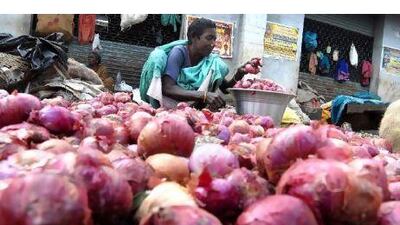Horamavu village seems like an odd place to take stock of the year, but it is in this little hamlet just outside Bangalore that I meet Nagappa, a fruit seller.
I am in Horamavu to find a boarding kennel for Inji, my Labrador, during the Christmas holidays. My vet tells me about this woman who takes in strays and also boards pets for a fee. So, here I am, in the dusty lanes of this tiny village, bordered by lily ponds and mango orchards, trying to find a bargain.
After driving for half an hour through winding roads, I decide that I am hopelessly lost and stop at Nagappa's fruit stand to buy a tender coconut. While I ask for directions, we get talking. He notices that I have cut my arm and suggests a poultice of raw onions and garlic.
"With the price of onions and garlic being what they are, I'd rather go to a doctor," I say.
Late and heavy monsoon rains have wreaked havoc on Indian crops, with onion growers facing a production fall of 50 per cent. In the past few weeks, the price of staples such as onions, tomatoes and garlic have risen eight-fold from 10 rupees a kilo to 80 rupees. India is now importing onions from Pakistan, Iran and Bangladesh. The department of revenue has scrapped the 5 per cent import duty that has been applied to onions.
Onion growers are staging protests and seeking compensation from the government for their losses; onion traders are making a killing, news reports say, while consumers are going easy on the onions and garlic that spice up Indian cuisine.
Nagappa and I commiserate with each other about how we have stopped making the biryanis and onion raitas that we are used to. That's when he says: "All these foreign presidents are coming and going. India is giving them so much business. Why can't our government do something for us, too?"
With that one sentence, Nagappa has connected the macroeconomic issue of energy security with the microeconomics of food security and inflation. In the past six months, India has welcomed a series of foreign leaders. David Cameron, the British prime minister, was here in July, inking several deals including a US$1.1 billion (Dh4.04bn) contract to supply 57 Hawk trainer jets. Barack Obama, the US president, visited last month and signed more than 20 agreements worth $10bn.
This month, Nicolas Sarkozy, the French president, signed a key deal worth $7bn for Areva of France to supply nuclear reactors. Also this month, Wen Jiabao, the Chinese premier, came and signed 48 memorandums of understanding and contracts worth $16bn.
The last straw, at least for Nagappa, was the $30bn deal that India signed with Dmitry Medvedev, the Russian president, in which Russia will supply fifth-generation fighter aircraft to us and build 18 nuclear reactors in three locations.
Energy-hungry India is bolstering its access to energy. Although domestic coal reserves account for 70 per cent of India's current needs, demand for energy is expected to double by 2025, by which time India will be importing 90 per cent of its petroleum. During Mr Medvedev's visit, ONGC Videsh, the overseas arm of India's state-owned Oil and Natural Gas Corporation, signed a deal with the Russian conglomerate JSFC Sistema that would give ONGC Videsh access to the oilfields of Titov and Trebs in the Arctic.
The overarching trend in all the agreements India has signed with visiting foreign leaders is related to the nation's energy security - defence, petroleum, nuclear reactors - but India's progress on food security and inflation has been tardy.
No wonder the fruit seller asks, "If our government has money to spend on fighter planes, why can't it bring down the price of onions?" In economic terms, the two are not interlinked, of course, but for Indians dealing with higher food prices, they seem gallingly linked.
The past few months has seen a runaway increase in food prices. As my milkwoman, who owns 10 cows, says: "If one item is expensive, we can stop buying that and make do with others. But if everything is more expensive, then what do we do? Stop eating?"
Prices of Indian dals (pulses), rice, vegetables and fruits have doubled or tripled, thanks to the errant monsoon. In Andhra Pradesh, the Telegu Desam Party's president, Chandrababu Naidu, has been on a hunger strike to seek higher compensation from the central government for farmers afflicted by natural calamities.
Not to be outdone, Jagan Reddy, the son of YSR Reddy, a former Andhra Pradesh chief Minister, announced a two-day hunger strike to secure a higher relief package for farmers, who have lost livelihood and life - the suicide rate among farmers in the state is particularly high - because of heavy rains.
The Reserve Bank of India and the Indian government are working to stem this food inflation by adjusting interest rates. Activists view these measures as mere palliatives.
Stemming inflation is only one side of the coin, they say. The problem is deeper and more systemic, thanks to poor distribution, greedy middlemen and wastage arising from poor storage. In a mixed economy such as India's, where the government is unwilling or unable to fully let go, the interplay between public and private-sector interests occasionally compounds the problem.
On one hand, the Indian government doles out huge food subsidies, and on the other hand, food storage and distribution are inefficient. With an election approaching in a couple of years, the Congress-led UPA government will have to turn its attention back to what one blogger calls the "puzzling [food] inflation" at the bottom of the pyramid. Doing so may not create the "fortune" that the late management guru CK Prahalad alluded to, but it will at least reduce, if not prevent, farmer suicides.
Shoba Narayan is a journalist and author based in Bangalore

